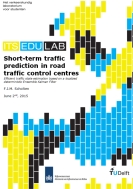The current state-of-the-practice in the Dutch operational road traffic management is mostly based on experience: the traffic manager judges the traffic dynamics on a road network on the basis of their previous experience and select the right control measures. As the amount of data and number of possible control measures available increases in the future, the Dutch operational traffic management needs to implement a good decision support system as the traffic managers can’t handle all this (possibly conflicting) information simultaneously. This decision support system should provide a clear view of the current and near-future situation on which the right control measures can be based. Despite some pilot studies and a lot of scientific research in traffic prediction, automated traffic estimation and predictions are not yet used in the Dutch operational traffic management.
The project described in this thesis had the objective to combine the current and near-future state of the practice with state-of-the-art knowledge in order to develop an architecture of a monitoring and prediction tool. Moreover, this thesis further examines the possible performance of such a tool by means of a prototype. By means of a requirement analysis, the most important requirements of an estimation and prediction tool were identified. From different use cases, it was derived that the estimation and prediction tool is most beneficial in non-recurrent situations. Moreover, the influence of the control measures taken by the traffic manager should be incorporated into the prediction results. On basis of these requirements, an architecture was developed. It was chosen that the predictions should be based on macroscopic simulation models, as these models are most competent to include non-recurrent conditions and control measures. An advanced state estimation method such as (the variants of) the Kalman filter is needed to adapt the simulation model to the traffic situation at hand.
A prototype was built in order to further analyse the performance of the data assimilation method. As data assimilation method, the Ensemble Kalman Filter (EnKF) was chosen instead of the Extended Kalman Filter, that is more commonly used in the state estimation of macroscopic traffic models. The EnKF was then theoretically analysed, and three improvements to the traditional formulation were identified and tested. The prototype was subjected to a number of simulation experiments in order to test the performance. Synthetic observations were used that are generated by a macroscopic traffic model. The prototype was able to estimate the traffic state reasonably well, approximately 40 times faster than real time, when no structural differences between the assimilation model and the true model. Especially the localization increased the accuracy considerably: it is not feasible to get the required accuracy using a global method. When imperfect system knowledge was assumed, the performance dropped. Further research and development of the prototype could increase the accuracy in these conditions by using additive errors instead of multiplicative errors. Further research should focus validating the model using observations from microscopic traffic models and real data. Moreover, more complex traffic models can be used.
